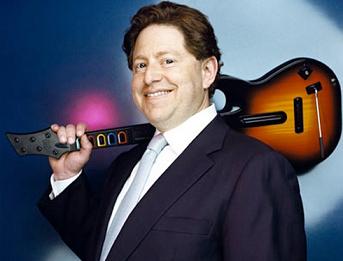[Editor's Note: This is a Vox Pop feature, a community editorial written by a Game Revolution user. This article was chosen by Game Revolution as an exceptional piece that deserves to be highlighted. The original article has been professionally edited, and the final edit below has been approved by the original author for any changes made and as a feature on the site. If you would like to see your work featured on Game Revolution, please see the contest guidelines here.
The views expressed in this article do not necessarily reflect those of Game Revolution or its employees.]
Dear Mr. Robert Kotick,
While I know you are a busy man as the CEO of Activision-Blizzard, I implore you to take some time to read this open letter to you, sir.
As a gamer for over twenty years, I have seen many trends come and go in our industry. Franchises were born through great perseverance and clever designs by the developers and publishers that you both control and represent in your company.
And a fine company it is. Activision has been a fixture since 1979, and has produced and developed great games for more than thirty years. And no doubt that Activision will continue to be a pillar of the video game industry, one that will not be shaken too much by any criticism that the company has, or will, receive. Even in this letter.
But I must confess: Your current business model is self-destructive. The announcement of the merger among your company, Vivendi, and Blizzard was probably the most lucrative and interesting deal since the merger between Squaresoft and Enix back in 2003. The excitement of seeing great franchises such as “Warcraft III” and “Tony Hawk” under one roof was palpable.
In the past few years, though, the excitement has deflated into a mere roll of the eyes. Since the merger, your company needlessly decided to cut great games under the guise of "excess". From that list were a slew of new IPs and a number of seemingly risky movie games, including Ghostbusters, Brutal Legend, Wet, and Chronicles of Riddick: Assault on Dark Athena. But while these games are not million-dollar sellers, in retrospect, these games have something that your current lineup lacks: creativity.
Your comments on the new direction Activision is taking only exacerbates the problem. In your words, your business model is based on games that "have the potential to be exploited every year on every platform with clear sequel potential and have the potential to become $100 million franchises”. It's an admirable goal, indeed, that will no doubt make the company rich in the short term. This narrow field of vision, however, is rife with cons.
Yes, profit margins for Activision-Blizzard and its subsidiaries have increased steadily, and the market for your game franchises has at least tripled in the past three years. Call of Duty 4: Modern Warfare has effectively revitalized the multiplayer world with its level up/role-playing style of customization and progression. Guitar Hero once revitalized the rhythm-based music genre, and despite some criticism, DJ Hero has effectively brought more talent from the music world into video games. You also attempted to innovate with the Tony Hawk series using its board peripheral, and you continually influence MMORPGs thanks to the updates to World of Warcraft.
However, from this narrow view of only wanting to produce million-dollar franchises, much is lost. Innovation in your company has become stagnant. Since the merger, there has only been one noticeable new IP: Prototype. Other than that, and Prototype was likely not as successful as you had hoped, the constant releasing of the same core franchises – Guitar Hero, Call of Duty, and Tony Hawk – has killed, is killing, and will kill sales. That's how over-saturation works.
Though Metacritic scores might show that those three franchises are holding steady, their quality is waning. That is the very problem with forcing franchised games to be released once a year. They become stagnant, boiler-plate, run of the mill, generic.
And gamers become jaded. Franchises steadily lose their luster and gamers begin to turn on them for something new or innovative. They won’t completely abandon them because of what made them great, but they become aware of this stagnancy. Note that I am taking about gamers, and not the general audience. I admit, we are a small and motley group, often quick to criticize and stubborn to change, but we make our opinions known, sometimes loudly, when we feel that there is a chance for something to change for the better.
 So you can understand our outrage at your dropping of Brutal Legend. And then suing Double Fine for a breach of contract after you readily dropped the game for $15 million dollars, claiming that the developer was still in contract. What is worse, your newest Guitar Hero game, Warriors of Rock, seems to have gleamed an art style similar to Brutal Legend. Heavy metal songs in a heavy metal fantasy world? The similarities are disappointing.
So you can understand our outrage at your dropping of Brutal Legend. And then suing Double Fine for a breach of contract after you readily dropped the game for $15 million dollars, claiming that the developer was still in contract. What is worse, your newest Guitar Hero game, Warriors of Rock, seems to have gleamed an art style similar to Brutal Legend. Heavy metal songs in a heavy metal fantasy world? The similarities are disappointing.
Even worse is your predicament with Infinity Ward, the former developer of Modern Warfare franchise. While I will not discuss the issues of this here because I do not know all of the details of this case, it is a media quagmire for your company. And for Call of Duty fans, it's a giant thorn in their side.
Your narrow focus on Activision's future is just a short term grab for profit, over the long-term rooting of franchises and fostering of innovative titles in the coming years. Video games is a business that was forged on risks and creativity; Activision's history shows this, and you should follow suit.
I hope that my words reach you, Mr. Kotick, as unlikely as this may be. I hope to see great things from Activision-Blizzard, and new IPs in your pipeline to revitalize your hardcore fan base. Otherwise, we will slowly but surely turn our backs on you.
Sincerely,
Robert “LinksOcarina” Grosso







